Columbia University Study Reveals 8 Lifestyle Habits Associated with Slowing Biological Age
Adults who eat well, are active, don’t smoke, get good sleep, manage weight, control cholesterol, and maintain blood sugar and blood pressure have a biological age six years younger than their actual age.
Highlights:
- Following the American Heart Association’s 8 lifestyle habits for improving heart health is correlated with slower aging.
- These 8 lifestyle habits are eating better, being more active, not smoking tobacco, getting enough sleep, managing weight, controlling cholesterol, managing blood sugar, and managing blood pressure.
Findings presented at this year’s American Heart Association’s (AHA’s) annual conference (Scientific Sessions 2023) show an association between younger biological age and higher heart health scores, as assessed by the AHA’s Life’s Essential 8. The study’s senior author, Dr. Nour Makarem said,
“Greater adherence to all Life’s Essential 8 metrics and improving your cardiovascular health can slow down your body’s aging process and have a lot of benefits down the line. Reduced biologic aging is not just associated with lower risk of chronic disease such as heart disease, it is also associated with longer life and lower risk of death.”
Following Heart Healthy Habits Slows Biological Aging
Participating in the study were 6,593 individuals who were on average 47 years old. From the participants, the researchers took several clinical measurements, nine in total, including blood sugar and inflammation levels. These clinical measurements were used to determine the biological age of the participants.
Biological age can be thought of as a more accurate determination of age in the context of health and longevity. When someone’s biological age is lower than their actual (chronological) age, they are considered to be aging slowly (decelerated aging). In contrast, when someone’s biological age is higher than their actual age, they are considered to be aging quickly (age acceleration).
A correlation was found between high scores on Life’s Essential 8, reflecting good heart health, and lower biological age, which was on average 6 years younger. This means that adherence to specific lifestyle habits can potentially slow the rate of aging and increase lifespan. These lifestyle habits are outlined below.
How to Age Slowly by Improving Heart Health

According to the AHA, the following are “Life’s Essential 8:”
1. Eat Better
- Eat only as many calories as needed according to your physical activity level.
- Eat whole foods, lots of fruits and vegetables, lean protein, nuts, and seeds. Also, cook in non-tropical cooking oils, such as olive oil.
- Limit sweetened drinks, alcohol, sodium, red and processed meats, refined carbohydrates like added sugars and processed grains, full-fat dairy products, highly processed foods, and tropical oils like coconut and palm.
- Avoid trans fat and partially hydrogenated oils, which are found in some commercial baked goods and fried foods.
2. Be More Active
- Each week, adults should get 2.5 hours of moderate physical activity (water aerobics, social dancing, gardening), 75 minutes of vigorous physical activity (running, swimming laps, jumping rope), or a combination of the two.
- Include muscle-strengthening resistance exercise (push-ups, pull-ups, squats, weight-lifting) at least twice per week.
- Gradually increase activity levels to maintain perceived difficulty and adequate intensity.
3. Quit Tobacco
- Cigarettes, e-cigarettes, and tobacco products contain toxic chemicals, as do their smoke, vapor, and liquids.
- Smoking is the most preventable cause of death in the United States and is linked to about one third of all deaths from heart disease and 90% of lung cancers.
4. Get Healthy Sleep
- Get 7 to 9 hours of sleep every night.
- Good sleep may prevent cardiovascular disease, cognitive decline, depression, high blood pressure, high blood sugar, high cholesterol, and obesity.
5. Manage Weight
- Manage weight by eating better and maintaining a body mass index (BMI) around 25.
- If having trouble, track your calories. You can reduce caloric intake by eating less and increase calories burned by increasing physical activity.
6. Control Cholesterol
- By eating better (reducing intake of fat from animal products) and staying active, you can keep “bad” LDL cholesterol levels low.
- Healthcare professionals can measure your cholesterol levels to determine if they are within healthy range.
7. Manage Blood Sugar
- By eating better (reducing intake of sugar and refined carbohydrates) and staying active, you can keep blood glucose levels within normal range.
- Healthcare professionals can measure your blood glucose levels to determine if they are within a healthy range.
8. Manage Blood Pressure
- Manage blood pressure by eating better (reducing intake of sodium), staying active, managing weight, avoiding nicotine, and sleeping well.
- Keep blood pressure levels less than 120/80 mm Hg. High blood pressure is defined as 130-139 mm Hg systolic pressure over 80-89 mm Hg diastolic pressure.
These Are Preliminary Findings
It should be noted that results presented at scientific conferences like the AHA’s Scientific Sessions 2023 have not yet been peer-reviewed. Therefore, the findings are considered preliminary until reviewed by scientists in the field. Additionally, due to the nature of the study, a cause-and-effect relationship between slower aging and heart health cannot be inferred. While not as likely, because the study is correlative, it is possible that those with younger biological age tend to follow heart-healthy habits, and not the other way around.

